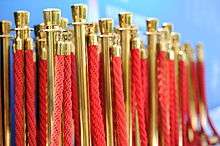stanchion
English
Etymology
From Old French estanson, estanchon, (Modern French étançon), from estance (“a stay, a prop”), from Latin stans (“standing”), present participle of stō.
Pronunciation
- enPR: stănʹshən, IPA(key): /ˈstænʃən/ or
- (Can we verify(+) this pronunciation?) enPR: stänʹshən, IPA(key): /ˈstɑːnʃən/
Noun
stanchion (plural stanchions)

Stanchions supporting velvet rope
- A vertical pole, post, or support.
- 1938, Xavier Herbert, Capricornia, New York: D. Appleton-Century, 1943, Chapter IX, p. 149,
- The train began to move. Lace walked with it, holding a stanchion.
- 2013, J. M. Coetzee, The Childhood of Jesus. Melbourne, Australia: The Text Publishing Company. chapter 27. p. 268.
- He staggers against a stanchion, trips over a rope, and tumbles into the space between the quay and the steel plates of the freighter.
- 1938, Xavier Herbert, Capricornia, New York: D. Appleton-Century, 1943, Chapter IX, p. 149,
- A framework of such posts, used to secure or confine cattle.
Translations
vertical pole, post or support
|
|
Verb
stanchion (third-person singular simple present stanchions, present participle stanchioning, simple past and past participle stanchioned)
References
- stanchion in Webster’s Revised Unabridged Dictionary, G. & C. Merriam, 1913.
This article is issued from
Wiktionary.
The text is licensed under Creative
Commons - Attribution - Sharealike.
Additional terms may apply for the media files.